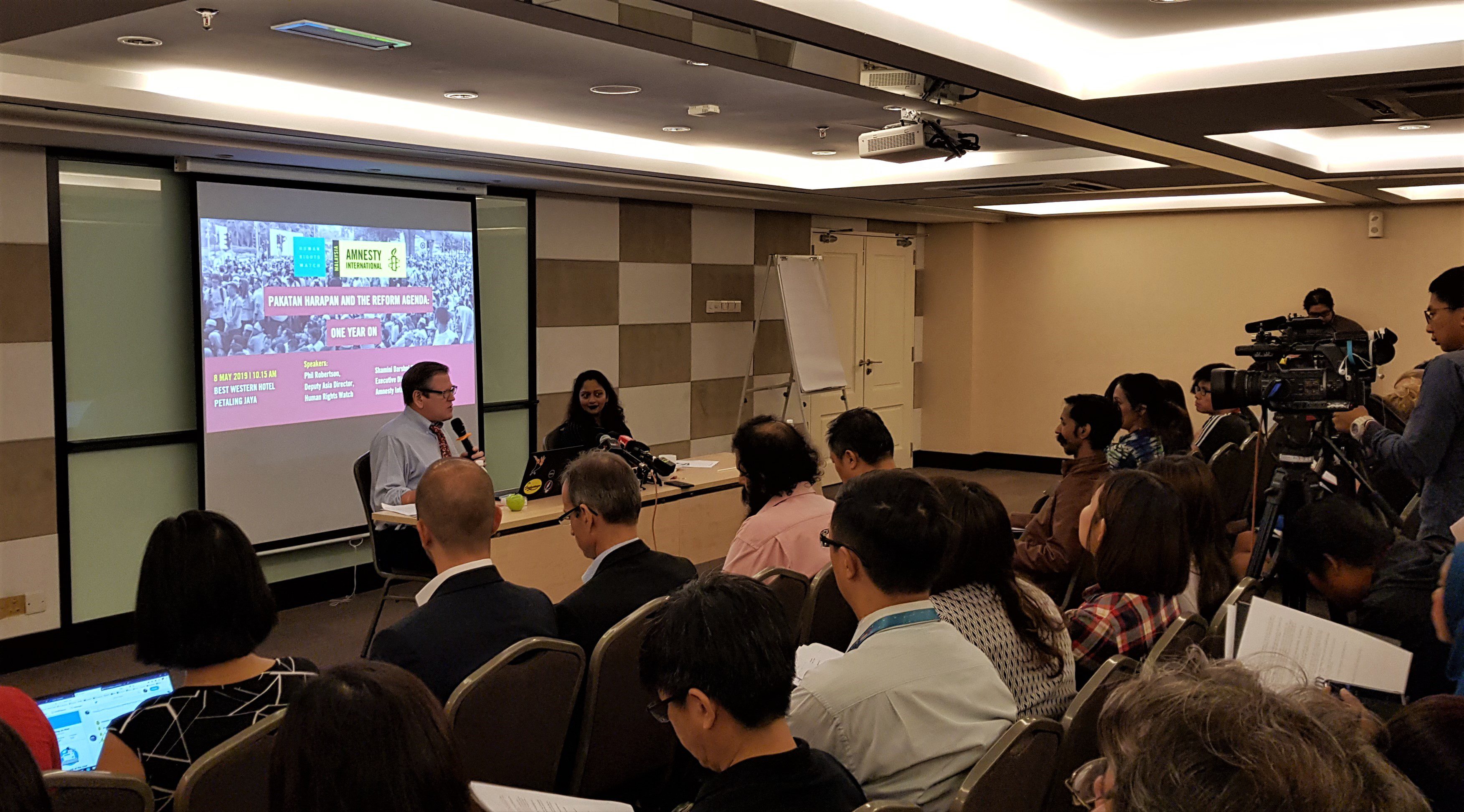AMNESTY INTERNATIONAL MALAYSIA
8 MAY 2018
PRESS RELEASE
Amnesty International Malaysia is calling on the Malaysian government to create a clear and strategic roadmap for introducing human rights reforms.
“When first assuming power a year ago, the government had notable intentions to introduce reforms including amending or abolishing repressive legislation and acceding to or ratifying international human rights instruments. However, after a year in power, we see a lack of clear direction towards these reforms. We need to see a plan that is clearly articulated and in the spirit of promoting and protecting human rights in the country,” Shamini Darshni Kaliemuthu, Executive Director of Amnesty International Malaysia, said today.
Shamini noted that some of the bold statements of rights reforms made in the past year were swiftly followed by disappointing U-turns, indicating a lack of political will.
“For example, the government announced the ratification of the International Convention on the Elimination of All Forms of Racial Discrimination (ICERD) and the accession to the Rome Statute but quickly backed down when these did not fly with certain quarters,” she said at a joint press conference with Phil Robertson, deputy Asia director of Human Rights Watch, in Kuala Lumpur today.
In December 2018, the government had also lifted a moratorium on six pieces of legislation – Sedition Act 1948, Section 223 of the Communications and Multimedia Act 1998 (CMA), Act 747 of the Security Offences (Special Measures) Act 2012 (SOSMA), the Prevention of Terrorism Act (POTA) and the Prevention of Crime Act 1959 (POCA) – purportedly for national security reasons.
“However, the Sedition Act, along with the Peaceful Assembly Act, were used to investigate organisers of the women’s march on held on 9 March, indicating that the trend to silence dissent and intimidate activists is not over. At different times, the Sedition Act and the CMA were used to arrest individuals for commenting on the abdication of the throne by the former Yang Di-Pertuan Agong. The culture of repression seemingly still prevails, and the government must address this.”
On abolition of the death penalty, Shamini noted that the Pakatan Harapan manifesto had pledged to abolish the mandatory death penalty for all crimes. In October 2018, the Law Minister Datuk Liew Vui Keong had announced the abolition of the death penalty in totality before announcing in March 2019 that it intended to keep to its manifesto promise.
“We are disappointed at this U-turn but consider the abolition of the mandatory death penalty as a step in the right direction towards total abolition. The Pakatan Harapan government needs to remain steadfast and demonstrate its commitment to human rights by abolishing first the mandatory death penalty, and then, full abolition in order to honour Article 5 of the Federal Constitution on the right to life and liberty and Article 3 of the Universal Declaration of Human Rights on the right to life.
On minority rights, the change in government has brought little impact in the protection of the rights of Lesbian, Gay, Bisexual, Transgender and Intersex (LGBTI) people in Malaysia.
“Although Religious Affairs Minister Datuk Dr Mujahid Yusof Rawa said that the LGBTI community in Malaysia deserves equal rights as citizens and that they cannot be discriminated against including at workplaces, there is a continuous trend of intimidation and censorship against the community,” Shamini said, in reference to the recent questioning of LGBTI activist Numan Afifi who was questioned over a speech given by another person at Malaysia’s Universal Periodical Review at the UN Human Rights Council in Geneva.
“This was an act of intimidation against a LGBTI human rights defender. We call on the Malaysian government to end all forms of intimidation against LGBTI persons and halt state-sanctioned discrimination against LGBTI Malaysians.”
On protecting the rights of indigenous people, the government took a historic step by instituting legal action against the state of Kelantan in seeking legal recognition of native land rights of the Temiar Orang Asli in Pos Simpor.
“We commend the federal government for upholding the rights of the Temiar, and hope that we will see the government step in when the rights of other Orang Asli and Orang Asal communities are being violated, including on indigenous land issues,” Shamini said.
In conclusion, Shamini said that the Pakatan Harapan has made inroads into introducing human rights reforms although they have been slow.
“We need the government to speed up some of these reforms, and to work with civil society organisations to plan and implement them,” Shamini said.


